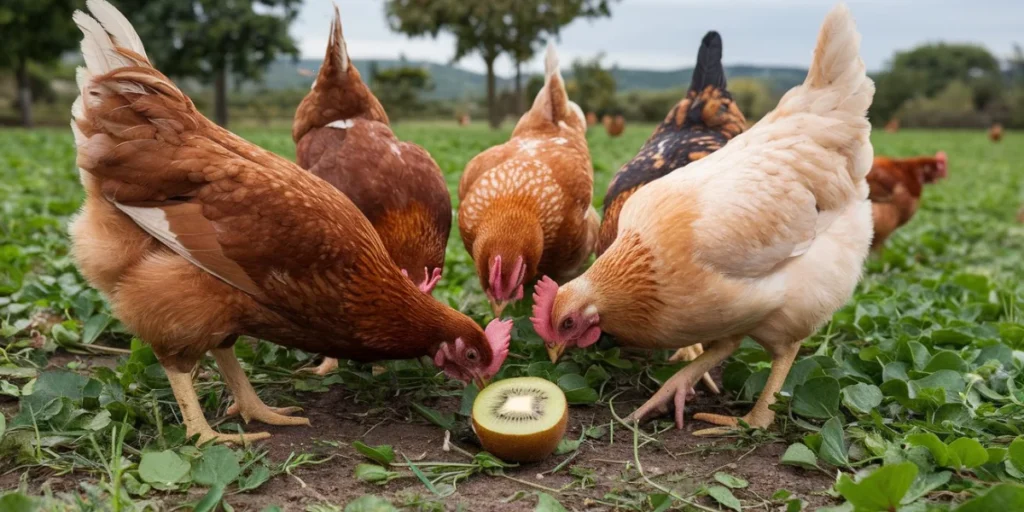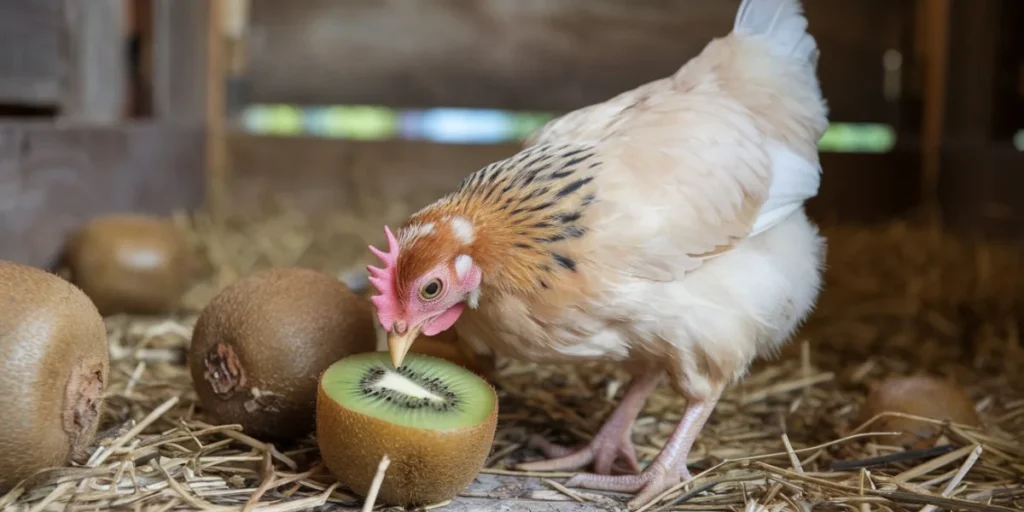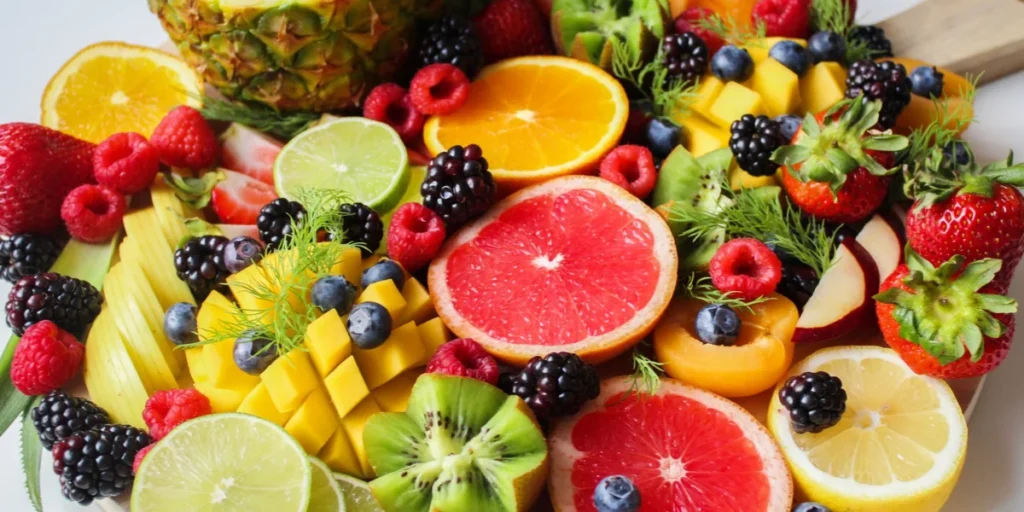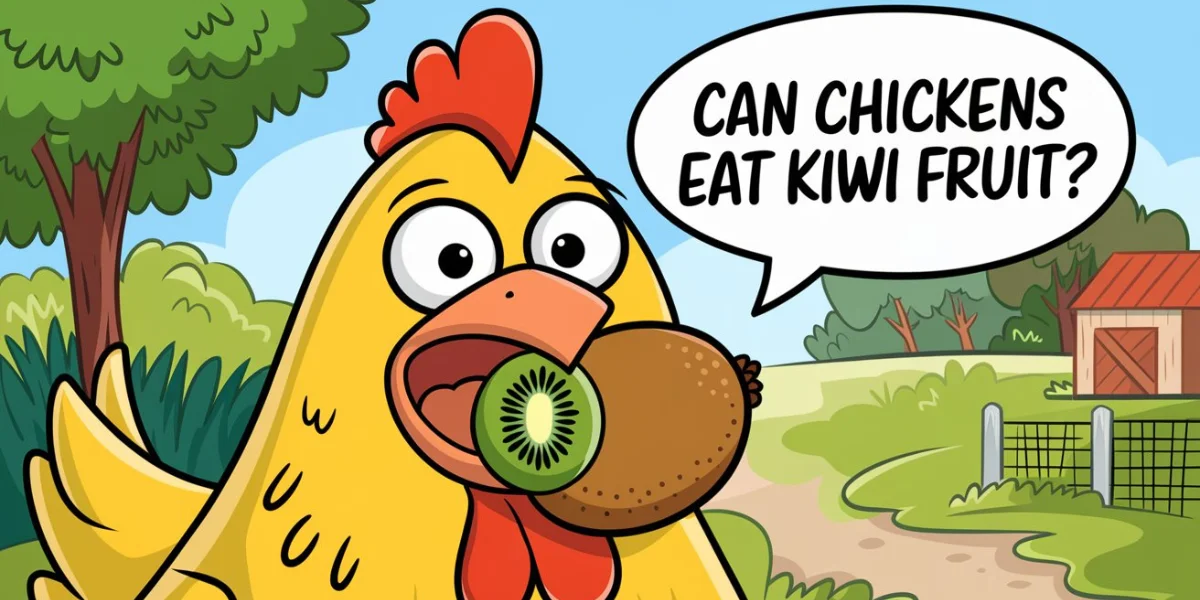Kiwi fruit can be a tasty and healthy treat for birds. It is full of vitamins, especially vitamin C, which helps keep birds strong. The soft, juicy flesh of the kiwi is easy for birds to eat, and the tiny seeds inside are safe for them. You can cut the kiwi into small pieces and offer it to your bird as a snack. Just make sure to remove the skin, as some birds may not like it. Feeding kiwi fruit to your bird once in a while can be a nice way to add variety to their diet!
Can chickens eat kiwi fruit?
Yes, chickens can eat kiwi fruit. It’s safe for them and can be a healthy treat. Kiwi is full of vitamins and nutrients that are good for chickens. Just make sure to cut the kiwi into small pieces and remove the skin before giving it to them.
Detailed Guide
Chickens are known for their varied diet, enjoying everything from grains to vegetables and fruits. One question that many chicken owners often ask is: Can chickens eat kiwi fruit? Kiwi fruit is a delicious, nutrient-rich fruit that many people love to eat, but is it safe and beneficial for chickens? This article will explore everything you need to know about feeding kiwi fruit to your flock, including its benefits, risks, how to prepare it, and other helpful tips.

Is Kiwi Fruit Safe for Chickens?
The short answer is yes, kiwi fruit is safe for chickens to eat. Kiwi is not toxic to chickens and can be a tasty, nutritious treat for them. However, like any treat, kiwi should be given in moderation. Chickens have specific dietary needs, and too much of any one type of food, even something healthy like fruit, can upset the balance of their diet.
Kiwi fruit is full of vitamins and minerals that are good for chickens, especially vitamins C and K. Chickens can benefit from these nutrients just like humans do. However, it’s important to remember that fruit should only be a small part of a chicken’s overall diet, with most of their nutrition coming from chicken feed.
Nutritional Value of Kiwi Fruit for Chickens
Kiwi fruit is packed with essential vitamins and nutrients. Below is a simple breakdown of the key nutrients found in kiwi fruit and how they can benefit your chickens:
| Nutrient | Benefit for Chickens |
|---|---|
| Vitamin C | Helps boost the immune system, especially during stress |
| Fiber | Aids in digestion and prevents constipation |
| Vitamin K | Supports healthy blood clotting and bone health |
| Potassium | Helps with proper muscle function and hydration |
| Vitamin E | Works as an antioxidant, protecting cells from damage |
| Folate | Important for cell growth and the health of the nervous system |
| Water (83%) | Helps keep chickens hydrated, especially in hot weather |
These nutrients show that kiwi fruit can offer some health benefits to chickens when given in moderation.
Benefits of Feeding Kiwi Fruit to Chickens
Feeding kiwi fruit to your chickens can provide several important benefits, making it a valuable addition to their diet, especially when used as a treat. Here are some of the main benefits:
Boosts the Immune System
Kiwi is high in vitamin C, which is known for its immune-boosting properties. Although chickens can naturally produce vitamin C in their bodies, during times of stress, such as during molting or extreme weather, their immune systems might need an extra boost. A small amount of kiwi can provide this extra support and help keep your chickens healthy.
Supports Digestive Health
The fiber in kiwi fruit helps improve digestion, which is important for chickens. Fiber helps keep their digestive system functioning properly, ensuring they can digest their regular feed efficiently. Chickens sometimes face digestive issues like crop impaction or constipation, and a small amount of fiber-rich fruit like kiwi can help prevent these problems.
Hydration
Kiwi fruit is made up of over 80% water, making it an excellent hydrating snack, particularly during hot weather. Chickens can become dehydrated quickly, especially when temperatures rise. Offering kiwi as a treat during summer can help them stay hydrated and cool.
Antioxidants
Kiwi contains antioxidants like vitamins C and E, which help protect the body’s cells from damage caused by free radicals. These antioxidants can improve the overall health of chickens, helping them maintain strong immune systems and reduce inflammation.
Variety in Diet
Adding kiwi to your chickens’ diet provides variety, which is important to keep them interested in their food. Chickens enjoy different textures and flavors, and offering them treats like kiwi keeps them happy and engaged. A varied diet can also prevent boredom in chickens, reducing stress and promoting a healthy environment in your coop.

Risks of Feeding Kiwi Fruit to Chickens
While kiwi fruit is generally safe for chickens, there are a few risks to be aware of when feeding it to your flock:
High Sugar Content
Kiwi fruit contains natural sugars, which can be harmful to chickens if consumed in large quantities. Too much sugar can lead to weight gain, digestive problems, and even behavioral issues in chickens. For this reason, kiwi should only be offered as an occasional treat and not as a regular part of their diet.
Overripe Kiwi
Avoid feeding chickens overripe kiwi fruit. When kiwi becomes too ripe, its sugars ferment, which can upset a chicken’s digestive system and lead to diarrhea or other digestive issues. Always check that the kiwi is fresh and not mushy before giving it to your chickens.
Imbalanced Diet
Chickens require a balanced diet that is rich in protein, calcium, and other essential nutrients. While kiwi fruit offers some benefits, it cannot replace the complete nutrition that chickens get from their regular feed. Overfeeding fruit, including kiwi, can lead to an imbalanced diet, which may result in malnutrition and other health problems.
Pesticide Residue
If you’re giving chickens store-bought kiwi fruit, be sure to wash it thoroughly before feeding it to them. Many fruits are treated with pesticides, which can be harmful to chickens if ingested. Washing the fruit will help remove any harmful chemicals.
How to Feed Kiwi Fruit to Chickens
Feeding kiwi to your chickens is simple, but it’s important to prepare it properly to ensure it’s safe and easy for them to eat. Here’s how to do it:
Remove the Skin
While the skin of a kiwi is edible for humans, it’s better to remove it when feeding it to chickens. The skin can be tough for chickens to digest, and some chickens may not like the texture. Removing the skin ensures they get the most out of the fruit without any digestive discomfort.
Cut into Small Pieces
Chickens don’t have teeth, so it’s important to cut the kiwi into small, manageable pieces. This makes it easier for them to eat and reduces the risk of choking. You can slice the kiwi into cubes or small chunks before offering it to your chickens.
Offer in Moderation
As with any treat, moderation is key. Offer kiwi fruit to your chickens as an occasional treat rather than a regular part of their diet. A small amount once or twice a week is enough to give them the nutritional benefits without overloading their system with sugar.
Mix with Other Fruits
For added variety, you can mix kiwi fruit with other safe fruits for chickens. This provides different textures and flavors, making their snack time more enjoyable. Just be sure to only mix fruits that are safe for chickens to eat.
Can Chickens Eat Kiwi Skin?
While the skin of the kiwi is technically safe for chickens to eat, it’s not recommended. The skin is rough and can be difficult for chickens to digest. Chickens might also find the texture unappealing and may avoid eating it altogether. For this reason, it’s best to peel the kiwi before feeding it to your chickens, so they can enjoy the soft, juicy flesh without any digestive problems.
How Much Kiwi Should Chickens Eat?
Kiwi fruit should only make up a small portion of your chickens’ diet. Chickens need a balanced diet that consists mainly of high-quality chicken feed, which is designed to meet all of their nutritional needs. Fruits like kiwi should only make up about 5-10% of their total diet.
Here’s a simple guideline:
- For a small flock of 5-6 chickens, one or two kiwis, cut into small pieces, once or twice a week is more than enough.
- For larger flocks, you can offer more kiwi, but be sure to balance it with other fruits and veggies to avoid overfeeding.
Remember, the main source of nutrition for chickens should always come from their regular feed, which provides the right balance of protein, vitamins, and minerals. Kiwi is a treat, not a substitute for their main food.
Alternatives to Kiwi Fruit for Chickens
While kiwi fruit is a great occasional treat for chickens, there are plenty of other fruits that are also safe and nutritious. If you’re looking to add more variety to your chickens’ diet, here are some great alternatives to kiwi:
| Fruit | Nutritional Benefits |
|---|---|
| Apples (without seeds) | High in fiber and vitamin C, supports digestion and immunity |
| Bananas | Rich in potassium and easy for chickens to eat |
| Blueberries | Packed with antioxidants, promotes healthy immune system |
| Watermelon | Hydrating and refreshing, especially in hot weather |
| Strawberries | High in vitamin C and antioxidants |
These fruits, like kiwi, should also be fed in moderation. Offering a variety of fruits as treats will provide different nutrients and keep your chickens happy and healthy.

Other Fruits That Are Safe for Chickens
In addition to kiwi and the fruits listed above, there are many other fruits that are safe for chickens to eat. However, it’s important to know which fruits are safe and which ones should be avoided.
Safe Fruits for Chickens
- Melons: Watermelon, cantaloupe, and honeydew are all great hydrating fruits that chickens love.
- Berries: Raspberries, blackberries, and cranberries are rich in antioxidants and are safe for chickens.
- Pineapple: Small amounts of pineapple can provide a burst of vitamin C and other nutrients.
- Grapes: Seedless grapes are safe in moderation, but they should be cut into small pieces to prevent choking.
Fruits to Avoid
Not all fruits are safe for chickens. Some fruits contain toxic compounds that can be harmful or even deadly to chickens. Here are a few fruits you should never feed to your chickens:
- Avocado: Contains a compound called persin, which is toxic to chickens.
- Citrus Fruits: Oranges, lemons, and grapefruits should be avoided because the high acidity can upset a chicken’s digestive system.
- Rhubarb: The leaves of rhubarb are toxic and can cause severe health issues in chickens.
How to Store and Serve Kiwi for Chickens
When feeding kiwi to chickens, it’s important to serve it fresh and store it properly. Kiwi fruit should be kept in the refrigerator to prevent spoilage. Before feeding kiwi to chickens, wash the fruit thoroughly to remove any pesticides or chemicals.
If you have extra kiwi that you won’t be able to use right away, you can freeze it. Frozen kiwi can be thawed and given to chickens as a cold, refreshing treat, especially during hot weather.
Conclusion: Can Chickens Eat Kiwi Fruit?
In conclusion, kiwi fruit is a safe and nutritious treat for chickens when fed in moderation. It’s packed with vitamins, minerals, and antioxidants that can benefit your flock’s health. However, kiwi should only be an occasional treat, not a regular part of their diet. Always prepare the kiwi by removing the skin and cutting it into small pieces before offering it to your chickens.
While kiwi is a great snack, remember that the primary diet of chickens should consist of high-quality chicken feed to ensure they receive all the necessary nutrients for a healthy life. Feeding your chickens a balanced diet with occasional treats like kiwi will keep them happy, healthy, and full of energy.
Safe Foods for Chickens
Chickens love to eat a variety of foods, but it’s important to know what is safe and healthy for them. Providing a balanced diet helps keep your chickens healthy, active, and happy. Along with their regular chicken feed, you can give them a range of fruits, vegetables, and other treats. Here’s a guide to safe foods for chickens that you can easily include in their diet.
Grains and Seeds
Grains are a staple in a chicken’s diet, and they are essential for providing energy. Most commercial chicken feeds are made up of grains like corn, wheat, and barley, which offer balanced nutrition. In addition to their feed, you can offer:
- Oats: These are a good source of energy and fiber. You can give oats as a treat, especially during colder months when chickens need extra energy.
- Sunflower Seeds: Chickens love sunflower seeds! They are packed with protein and healthy fats. Just make sure they are unsalted and free from additives.
Vegetables
Vegetables are a great source of vitamins and minerals for chickens. They enjoy eating a variety of fresh veggies, and many are perfectly safe for them. Here are some popular options:
- Leafy Greens: Chickens love greens like lettuce, spinach, kale, and cabbage. These vegetables are rich in vitamins and can help keep your chickens healthy.
- Carrots: You can feed chickens raw or cooked carrots. They’re full of beta-carotene, which is good for eyesight and overall health.
- Peas: Peas are a favorite treat among chickens and are rich in protein.
- Pumpkin: Both the seeds and the flesh of pumpkins are safe for chickens. Pumpkins are great for boosting their immune system, especially in the fall and winter months.
- Cucumbers: Cucumbers are hydrating and make for a great refreshing snack during hot weather.
Fruits
While fruits are high in natural sugars, they can be given to chickens in moderation. They make a tasty and healthy treat, providing vitamins and hydration. Some safe fruits for chickens include:
- Apples: Chickens can eat apple slices, but make sure to remove the seeds as they contain small amounts of cyanide.
- Berries: Chickens love berries like strawberries, blueberries, and raspberries. They are rich in antioxidants and can be fed fresh or frozen.
- Watermelon: During hot weather, watermelon is a favorite snack. It helps keep chickens hydrated and provides important vitamins.
- Bananas: Bananas are a soft, easy-to-eat treat that provides potassium and other nutrients. Just be sure to give them in small amounts.
Protein-Rich Foods
Chickens need protein to stay strong and healthy. While most of their protein comes from their feed, you can supplement their diet with other protein-rich foods, especially during molting when they need extra protein for feather growth. Some good options include:
- Cooked Eggs: Eggs are an excellent source of protein for chickens. Cook the eggs before feeding them to prevent them from learning to eat their own eggs.
- Mealworms: Dried or live mealworms are a favorite protein-rich snack for chickens. They’re especially helpful during molting.
- Fish: Cooked fish is another high-protein food that chickens can enjoy. It’s rich in omega-3 fatty acids, which promote healthy feathers and skin.
Other Safe Treats
In addition to grains, vegetables, fruits, and protein-rich foods, there are other safe treats you can occasionally give to your chickens:
- Plain Yogurt: Chickens can eat plain, unsweetened yogurt. It’s good for their digestion because it contains probiotics.
- Rice and Pasta: Plain, cooked rice and pasta can be given as a treat. Make sure it’s not seasoned or salted.
- Bread: Small amounts of plain bread can be fed to chickens. However, avoid giving them too much as bread is low in nutrients.
Foods to Avoid
While many foods are safe for chickens, there are some that you should avoid because they can be harmful or toxic:
- Avocados: Avocados contain a toxin called persin, which can be deadly to chickens.
- Chocolate: Chocolate contains theobromine, which is toxic to chickens.
- Onions: Onions contain substances that can harm a chicken’s red blood cells.
- Raw Beans: Uncooked beans contain a toxin called lectin, which is dangerous to chickens.
- Citrus Fruits: Fruits like oranges, lemons, and grapefruits can upset a chicken’s digestive system due to their high acidity.
FAQs
Can chickens eat kiwi fruit skin?
It’s best to remove the skin, as it’s tough for chickens to digest.
How often can I give kiwi to my chickens?
Offer kiwi as an occasional treat, about once or twice a week.
Is kiwi healthy for chickens?
Yes, kiwi is packed with vitamins like C and fiber, but feed it in moderation.
Can baby chicks eat kiwi?
It’s better to wait until chicks are fully grown before offering kiwi.
What fruits should chickens avoid?
Avoid avocados, citrus fruits, and rhubarb, as they can be harmful.

93ywgq